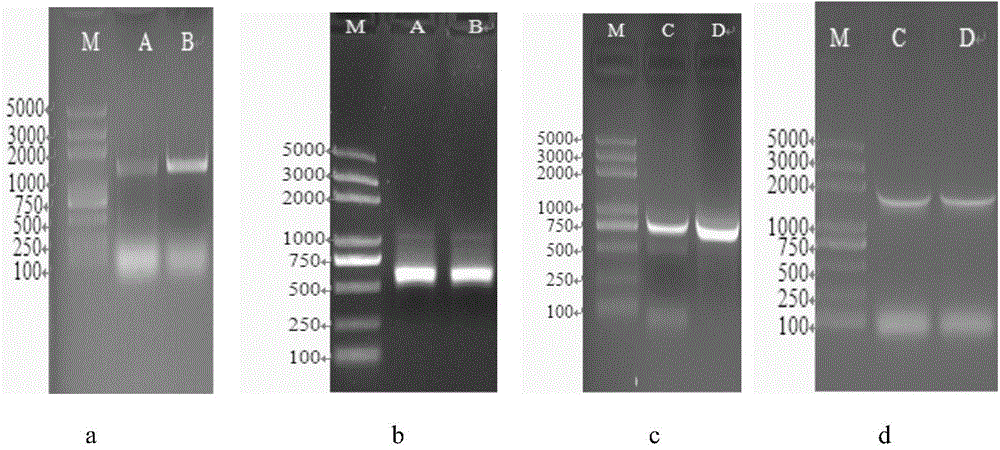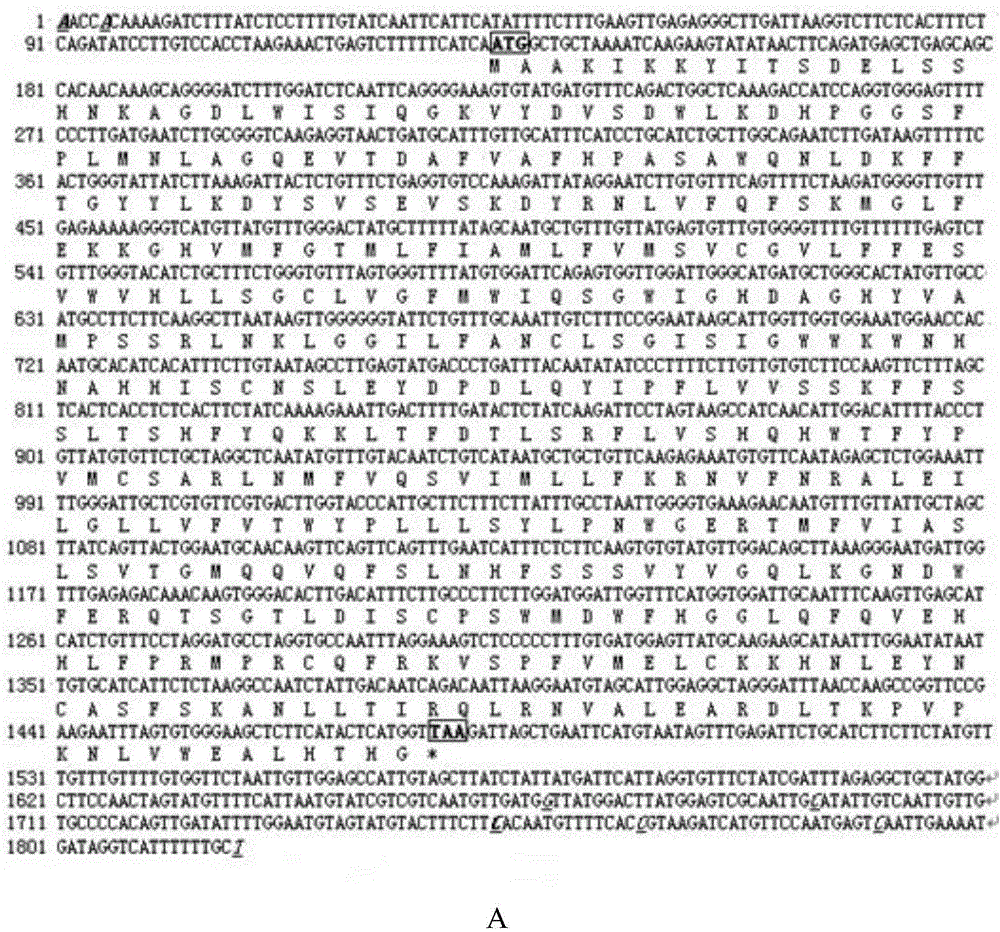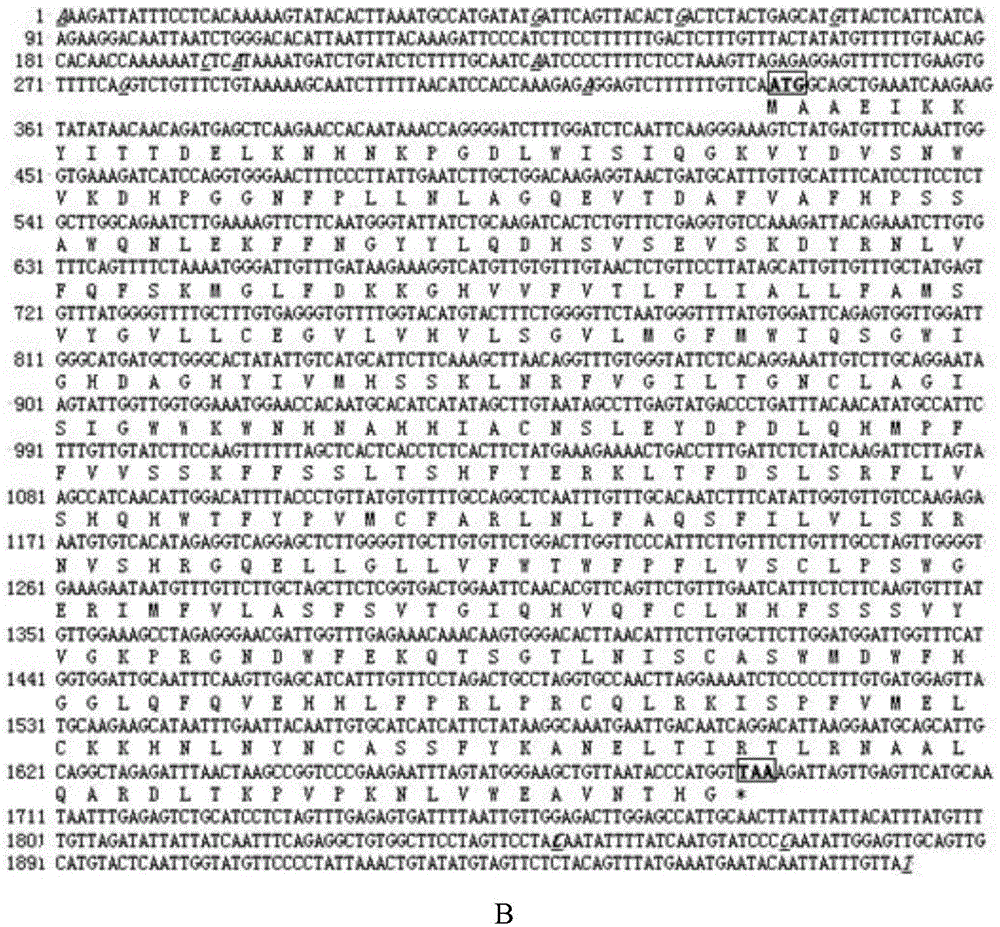Microula sikkimensis delta 6-fatty acid desaturase MsD6D gene family as well as recombinant expression vector and application of MsD6D gene family
A gene family and expression vector technology, applied in the field of genetic engineering, can solve the problems of high price, high cost and complicated operation
- Summary
- Abstract
- Description
- Claims
- Application Information
AI Technical Summary
Problems solved by technology
Method used
Image
Examples
Embodiment 1
[0035] Embodiment 1, the cloning of microspore grass D6D (MsD6D) gene family
[0036] (1) Extraction of total DNA and total RNA of Microporus genome
[0037] The young leaves of Microporus plants were taken, and the total genomic DNA was extracted by the cetyltrimethylammonium bromide (CTAB) method, and the quality and concentration of the nucleic acid samples were evaluated by 1.0% agarose gel electrophoresis and spectrophotometry. The results showed that the total DNA of the extracted Microspore genome had good integrity, the average molecular weight was slightly larger than the 23kb band of λ-HindIII DNA Marker, the RNA was completely digested, and the purity was high by spectrophotometry, which could be used for PCR amplification.
[0038] At the same time, the roots (Ro), stems (St), leaves (Le), buds (Bu), flowers (Fl), early seeds (ES), middle seeds (MS) and late seeds (LS) of Microporus For materials, total RNA was extracted with a small amount of plant tissue RNA ext...
Embodiment 2
[0053] Embodiment 2, the bioinformatics analysis of MsD6D gene family
[0054] Perform gene and protein annotation, sequence alignment, open reading frame (ORF) search and translation, parameter analysis on Vector NTI Advance 9.0, and perform BLAST and protein on http: / / www.ncbi.nlm.nih.gov / CDD search, protein structure analysis at http: / / bip.weizmann.ac.il / and bioinformatics sites with links such as www.expasy.org at http: / / prodes.toulouse.inra.fr / multalin / multalin.html and http: / / www.ebi.ac.uk / clustalw / for multiple alignment and phylogenetic analysis of gene and protein sequences.
[0055] (1) Structure and nucleic acid characteristics of the gene family of MsD6D
[0056] MsD6D1 as figure 2 As shown in middle A, the result shows that the MsD6D1 gene is 1818bp, and the longest mRNA is 1818bp (excluding the poly(A) tail, the same below), where A1 and A5 are the transcription start sites, and the longest 5'UTR (untranslated region) 132bp, G 1668 、C 1694 、C 1753 、C 1...
Embodiment 3
[0068] Example 3, MsD6D gene family expression organ-specific fluorescent quantitative PCR detection
[0069] The total RNA of roots (Ro), stems (St), leaves (Le), buds (Bu), flowers (Fl), early seeds (ES), middle seeds (MS) and late seeds (LS) of Microporus , and then treated with RNase-free DNase I according to its instructions to eliminate DNA contamination. Take 1 μg of total RNA from each organ, and use PrimeScript in a 20 μl system TM RT reagent Kit with gDNA Eraser for reverse transcription to obtain the first strand of total cDNA for gene expression detection. Fluorescent quantitative PCR detection was carried out on the CFX96 quantitative PCR instrument, and the kit was Premix Ex Taq TM II (Tli RNaseH Plus) ROX plus uses the primer combination F25S and R25S for internal standard amplification. The primer combinations for MsD6D1 and MsD6D2 are FMsD6D1S and RMsD6D1S, FMsD6D2S and RMsD6D2S, respectively. The primer sequences are shown in Table 2.
[0070] Fluoresc...
PUM
 Login to View More
Login to View More Abstract
Description
Claims
Application Information
 Login to View More
Login to View More - R&D
- Intellectual Property
- Life Sciences
- Materials
- Tech Scout
- Unparalleled Data Quality
- Higher Quality Content
- 60% Fewer Hallucinations
Browse by: Latest US Patents, China's latest patents, Technical Efficacy Thesaurus, Application Domain, Technology Topic, Popular Technical Reports.
© 2025 PatSnap. All rights reserved.Legal|Privacy policy|Modern Slavery Act Transparency Statement|Sitemap|About US| Contact US: help@patsnap.com



